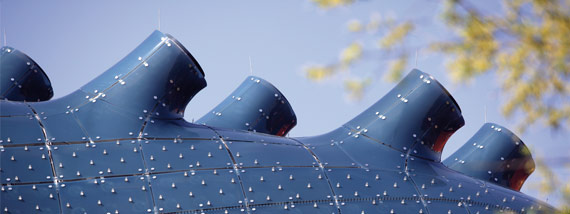Young Researchers' Minisymposium
YR Me1 Nonlinear dynamics in technical systems
Daniel Hochlenert (TU Berlin), Gottfried Spelsberg-Korspeter (TU Darmstadt)
Nonlinear effects can be observed in basically every dynamical mechanical system. The nonlinear behavior may be essential for the system's function, as e.g. for a snap-through mechanism, or just an immanent property of system due to nonlinear material characteristics and arising large displacements for example. In the second case, the mathematical mechanical model of the technical system is typically linearized around an operating state and the dynamics of the system is analyzed based on the linearized model. However, the omnipresent optimization of technical systems requires an increasing accuracy of the mathematical mechanical models such that analysis and understanding of nonlinear effects becomes more and more important. The focus of this minisymposium is on the mathematical modeling and on the analysis of nonlinear mechanical systems originating from technical applications.
Fadi Dohnal investigates strongly nonlinear vibration devices in order to damp free vibrations. The devices are designed such that the system's energy due to nontrivial initial conditions is dissipated as fast as possible. The devices are superior to conventional linear dampers since the decay of energy is not depending on the frequency. Furthermore the devices can be built much smaller and lighter than conventional dampers.
Kristin de Payrebrune's talk deals with the production process of carbide drills. The model describing the interaction of the grinding wheel and the work piece, i.e. the carbide drill, includes the nonlinear contact mechanics and the topography of the grinding wheel. Comparing simulation and corresponding experiments the operating forces and the accuracy of the production process is analyzed.
Wolfram Martens considers multi-degree-of-freedom nonlinear systems with stochastic excitation. Representing the excitation as a random process a variety of technically relevant inputs such as rough roads or wind/ocean excitation can be considered. Solving the corresponding Fokker-Planck equation the probability distribution of the system’s states is analyzed.
Aydin Boyaci studies nonlinear phenomena in automotive turbochargers. Due to the high rotation speeds floating ring bearings are used instead of usual hydrodynamic bearings. For this application a linear stability analysis does not give sufficient insight into the problem since the rotors become unstable at low critical speeds. The nonlinear system has to be analyzed in order to determine whether the occurring limit cycles allow for a save operation or dangerous so called critical limit cycles damaging the rotor are reached. The analysis is performed using methods of numerical continuation.
Fadi Dohnal (TU Darmstadt): Nonlinear energy sinks for the dissipation of free oscillations
Kristin de Payrebrune (TU Bergakademie Freiberg): Nonlinear process-machine interaction in tool grinding
Wolfram Martens (TU Berlin): Nonlinear mechanical systems with stochastic excitation
Aydin Boyaci (KIT Karlsruhe): Mode interactions and critical speeds of rotors in nonlinear hydrodynamic bearings
|

